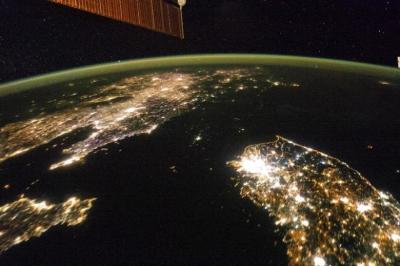Where is Heaven?

Let’s look for a moment at what Paul wrote regarding the heavenly realm in 2 Corinthians 12:2–3: “I know a man in Christ who was caught up to the third heaven fourteen years ago. Whether he was in the body or out of the body, I don’t know; God knows. I know that this man—whether in the body or out of the body I don’t know; God knows.” This verse contains a phrase we’re not entirely familiar with today.
In Paul’s day, the Jews understood heaven in three categories (see Gen. 6:7, Deut. 4:19, and 2 Cor. 12:10 respectively). The first heaven was the atmosphere in which we live today. Humans, animals, and sea creatures inhabit this realm. The second heaven was outer space where planets and stars reside. The third heaven was the dwelling place of God, at times given the designation “paradise.” We see this in Luke 23:43, “And he said to him, “Truly I tell you, today you will be with me in paradise,” and in Revelation 2:7, “Let anyone who has ears to hear listen to what the Spirit says to the churches. To the one who conquers, I will give the right to eat from the tree of life, which is in the paradise of God.”
Heaven is not a future destination hidden in the solar system; it’s the supernatural dimension of God. But in the verses from 2 Corinthians, Paul connected the two worlds together. The spiritual and the physical meeting in one place. In his case, he experienced it in the present.
First-century residents of Israel would have understood the immediacy of God’s kingdom on Earth. Wright explains the mindset of the early Christians:
When Jesus tells the brigand [thief on the cross] that he will join him in paradise that very day, paradise clearly cannot be their ultimate destination, as Luke’s next chapter makes clear. Paradise is, rather the blissful garden where God’s people rest prior to the resurrection. When Jesus declares that there are many dwelling places in his father’s house, the word for dwelling place is mone, which denotes a temporary lodging. When Paul says that his desire is “to depart to be with Christ which is far better,” he is indeed shining of a blissful life with his Lord immediately after death, but this is only the prelude to the resurrection itself.9
The prevailing mindset of a first-century believer was a renewed vocation on Earth, not a spot in heaven. Today, most Christians are trying to get out of this world; Jesus desires to break into this world through them. His is not a salvation “out of” the world; it is a rescue mission “within” the world.10
What if the Christian life was so much more than just a one-time decision to secure a place in heaven? What if our absorption with having our names called on the heavenly roll has perpetuated missed opportunities in ministry here and now? What if you could experience heaven on Earth today? I’m not promising flying angels singing praise music as we enjoy our renewed, resurrected bodies. What I’m envisioning is the satisfied, abundant life Jesus promised. A life that—regardless of your circumstances or your present context—experiences joy, happiness, and peace that is difficult to encapsulate in human terms. What if heaven was available to us today?
I think it is.
This is an excerpt from Here And Now: Thriving in the Kingdom of Heaven Today by Robby Gallaty (B&H, 2019). Used with permission. We have been taught that salvation is getting man out of earth to live in heaven, but the Bible teaches that God desires to bring heaven to earth through man. Jesus spoke about the Kingdom of Heaven more than any other topic. Learn how God’s Kingdom can invade your life today.




























